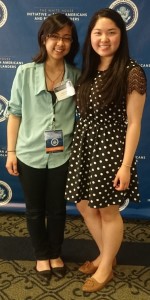Below is a reflection from Krysty Shen ’17, a student who attended the White House Summit on Asian Americans and Pacific Islanders. Krysty was awarded a Community Engagement Mini-Grant to attend the trip.
I had the pleasure of attending the White House Summit on Asian Americans and Pacific Islanders (AAPIs) on May 12, 2015. This Summit was sponsored by the White House Initiative on AAPIs, and it was the first one of many to come. Many attended, including AAPI political, social, and cultural leaders. Being sponsored by the government and in Washington D.C., I was awed by the government officials who took time to be present on panels and those who lead small sessions discussing issues pertaining to the AAPI community.
One thing I really appreciated from this conference was its attention to Southeast Asians. With past AAPI conferences that I’ve attended, I noticed they emphasized East Asian, which were the first Asian settlers in the United States during the 19th and early 20th century. In more recent years, Asian immigrants are primarily coming from Southeast Asia, usually as refugees. Their experience is completely different compared to the East Asians who immigrated over half a century ago. Southeast Asian refugees experience higher levels of poverty and are usually lacking support in education and other methods of advancement.
Also, this conference was a good mix of discussing issues and celebrating achievements. The opening and closing ceremonies included a mix of performing arts and panels. Within the panels, there were ones with political figures (e.g. U.S. Secretaries) and ones with entertainers (e.g. actors). There was also a wide variety of break-out lunch sessions to attend, and I wish I could have gone to more than one.
As someone who identifies as Asian American, it was extremely inspiring to see so many older and successful AAPIs also involved in issues pertaining to our community. I am aware that this racial fight has been present for a long time, but it never really occurred to me how so many AAPIs of different generations are still involved in the strive for racial equality. Also, as a second generation in the United States, I’ve never seen older AAPIs so politically involved because my immediate community was heavy on immigrant parents trying to make a living; racial discrimination and speaking out against it was not a primary concern for most of these first-generation parents. This conference gave me a very welcoming insight of how I hope be like in a few years — still very involved with advancing the AAPI community.
For more information about the aim of the conference Krysty attended, see http://www.ed.gov/edblogs/aapi/white-house-summit/.
-Krysty Shen ’17
